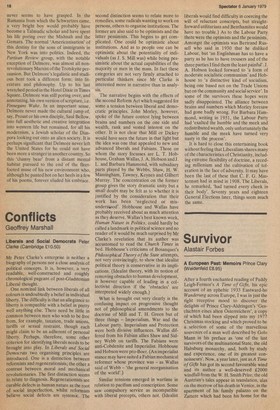Conflicts
Geoffrey Marshall
Liberals and Social Democrats Peter Clarke (Cambridge £10-.50)
Mr Peter Clarke's enterprise is neither a biography of persons nor a close analysis of political concepts. It is, however, a very readable, well-constructed and roughly chronological pageant of post-Gladstonian Liberal thought.
One nominal link between liberals of all colours is undoubtedly a belief in individual liberty. The difficulty is that an allegiance to liberty is compatible with a belief in pretty well anything else. There need be little in common between men who wish to be free from, for example, taxation, trade unions, tariffs or sexual restraint, though each might claim to be an adherent of personal liberty. Perhaps, therefore, some other criterion for identifying liberals needs to be brought into play. In Liberals and Social Democrats two organising principles are introduced. One is a distinction between reformists and regenerationists; the other a contrast between moral and mechanical revolutionaries. The first distinction seems to relate to diagnosis. Regenerationists see curable defects in human nature as the root of social imperfection, whilst reformists believe social defects are systemic. The second distinction seems to relate more to remedies, some radicals wanting to work on persons, others to organise institutions. The former are also said to be optimists and the latter pessimists. This begins to get complicated. One could be optimistic about institutions. And as to people one can be optimistic about the potentiality of individuals (as J. S. Mill was) while being pessimistic about the actual capabilities of the majority or men in the mass. In fact these categories are not very firmly attached to particular thinkers since Mr Clarke is interested more in narrative than in analysis.
The narrative begins with the effects of the second Reform Act which suggested for some a tension between liberal and democratic principles. John Morley, however, spoke of the future contest lying between brains and numbers on the one side and wealth, rank and vested interest on the other. It is not clear that Mill or Dickey would have seen the future in that light but the idea was one that appealed to new and advanced liberals and Fabians. Those on whom the story focusses are L. T. Hobhouse, Graham Wallas, J. A. Hobson and J. L. and Barbara Hammond, with subsidiary parts played by the Webbs, Shaw, H. W. Massingham, Tawney, Keynes and Gilbert Murray. The concentration on the former group gives the story dramatic unity but a small doubt may be felt as to whether it is justified by the consideration that their work has been 'neglected or misunderstood'. Hobhouse and Wallas have probably received about as much attention as they deserve. Wallas's best known work, Human Nature in Politics, could hardly be called a landmark in political science and no reader of it would be much surprised by Mr Clarke's revelation that its author was accustomed to read the Church Times in bed. Hobhouse's criticisms of Bosanquet's Philosophical Theory of the State attempts, not very convincingly, to show that idealist political theory is conservative in its implications. (Idealist theory, with its notion of removing obstacles to human development, is however capable of leading in a collectivist direction if the `obstacles' are interpreted widely enough.) What is brought out very clearly is the confusing impact on progressive thought not of philosophical amendments to the doctrine of Mill and T. H. Green but of three things — Imperialism, War and the Labour party. Imperialism and Protection were both divisive influences. Wallas differed from his Fabian allies Shaw and Sidney Webb on tariffs. The Fabians were anti-Cobdenite and Imperialist. Hobhouse and Hobson were pro-Boer. (An imperialist stance may have suited a Fabian mechanical reformer whose province was — as Wallas said of Webb — 'the general reorganisation of the world') Similar tensions emerged in wartime in relation to pacifism and conscription. Some saw compulsory service as incompatible with liberal precepts, others not. (Idealist liberals would find difficulty in coercing the will of reluctant conscripts, but straightforward utilitarians and Benthamites would have no trouble.) As to the Labour Party there were the optimists and the pessimists. Amongst the optimists was Bertrand Russell who said in 1930 that he disliked Labour, but 'an Englishman has to have a party as he has to have trousers and of the three parties I find them the least painful'. J. A. Hobson looked forward to `a form of moderate socialistic communism' and Hobhouse to `a distinctive kind of socialism, being one based not on the Trade Unions but on the community and social service'. In some of the survivors these hopes were sadly disappointed. The alliance between brains and numbers which Morley foresaw had gone badly wrong. For Barbara Hammond, writing in 1951, the Labour Party had `exalted the humble and the meek and redistributed wealth, only unfortunately the humble and the meek have turned very nasty in the process'.
It is hard to close this entertaining book without feeling that Liberalism shares many of the characteristics of Christianity, including extreme flexibility of doctrine, a receding millenium and the cultivation of toleration in the face of adversity. It may have been the last of these that C. F. G. Masterman had in mind in 1908. The Liberals, he remarked, 'had turned every cheek in their body'. Seventy years and eighteen General Elections later, things seem much the same.






























 Previous page
Previous page